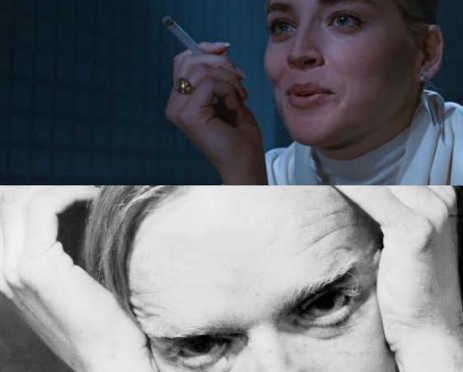Has there ever been a more nefarious writer rendered to the screen than Catherine Tramell (Sharon Stone) in Basic Instinct? It’s unlikely. There has, however, been that real life writer monster, Truman Capote, renowned for his ability to fuck everyone over for the story. Similar to Catherine, Truman used his knack for getting close to people under the guise of sensitivity (though, in Catherine’s case, the non-guise of hyper-sexuality tends to be her weapon of choice).
Most notoriously, Capote’s In Cold Blood showcases his skill for disconnecting from the subject of his prose (something Tramell can easily identify with) while simultaneously acting as though he is attached to it–or rather, him. Most notably attracted to the underlying delicate nature and fatal flaws of Perry Smith, Capote repurposed his “character” to make him seem more empathetic, as though a pawn of the truly soulless Dick Hickock in the brutal murders of the Clutter family. Primarily for the purpose of a more compelling narrative, Truman contrasts Perry against Dick. Unlike Dick, Perry, through Capote’s eyes, is a product of his environment–turning to crime only because of his unfortunate circumstances of birth preventing him from the education that might have saved him from a life of criminal activity. Dick, on the other hand, is naturally calculated, doomed to be a cold-blooded killer in the making.
While Catherine’s primary motive for writing is to use her novels as an alibi (only a psychopathic narcissist would detail the gory details of her own crimes and think she could get away with it), there is a distinct joy she gets from the rehashing of her kills. It’s almost as though murdering and writing can’t exist without one another in Catherine’s world. Eerily enough, this is true on a metaphorical level for most writers, who derive, at least latently, a sickly cathartic pleasure from “murdering” those who have wronged them.
In both instances of Capote and Tramell’s writing predilection, it appears as though each is motivated by the art as a means of capturing a form of vengeance. For Capote, being dismissed as the twee little gay boy incapable of masculinity during an era when it was of high currency, writing served as something of a superpower, armor against anyone who tried to toy with him–because he could do it right back with the harmful damage of the written word. And, for Tramell, deflecting the inevitable fallout of interpersonal relationships propels her not just to kill, but to seek “use” out of growing, on the surface, connected to people by inserting them into the pages of her novels–and, in doing so, maybe denying culpability for ultimately murdering them since they’re now immortalized in art.
Like Capote, Tramell has no qualms about writing people into her novels to fit the pre-molded narrative she wants. Once they’ve served her purpose and she’s gleaned all she can from them for her character notes, it’s time to move on. Similarly, Capote acted just as callous with Perry, feigning ignorance when the latter asked him what the title of his book was, naively assuming that Capote would come up with something slightly more exonerating than In Cold Blood based on all the time they spent together. He was also nowhere to be found for help when Perry inquired as to whether Capote could use his clout to get him a different appeals lawyer so that he might evade, or at least delay, the execution. But an execution was the desired, “neat and clean” ending Capote wanted for his true to life masterpiece.
Alas, it would seem that only the most sociopathic of people flock to the career of “novelist.” Capote, after all, died friendless and alone after being ostracized by the very people he skewered in print (including Slim Keith, Gloria Vanderbilt, and Babe Paley). Thus, perhaps it really is like Tramell says, “I’m a writer. I use people for what I write. Let the world beware.” With this in mind, never befriend or involve yourself in a romantic dalliance with one if you want to make it out physically and/or emotionally unscathed.






















